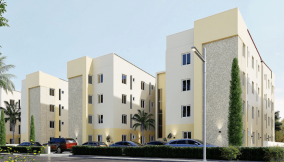The prevailing economic situation in Nigeria today means that the only asset class left for investors to put their money in and expect to get it back not only intact, but also with something added, is real estate, experts have said.
The experts explain that with an unprecedented high foreign exchange rate that takes over N700.00 for $1 at the parallel market, and hyper inflation that peaked at 19.64 percent in July 2022, household income has not only diminished, but the value of whatever is left in their pocket is worthless.
They advise that those who still have capacity and appetite for investment should do so in real estate , warning, however, that they, especially those who are doing so for the first time, should be cautious.
“Real estate ownership involves more than just making a financial commitment, particularly when the property in question is intended to be occupied by residents,” Lanre Awode, an investment analyst and advisor at Alpha Mead Group, noted, pointing out, however that, “a sense of accomplishment and elevated social standing are both benefits of property ownership.”
Awode told BusinessDay at the weekend that a variety of considerations need to be given prior to either the construction or purchase of real estate, saying that the lifestyle that would be supported by the possible purchase and its location are the two aspects of these considerations that are most essential.
According to him, a significant factor to take into account is the property and its location’s nearness to Central Business Districts, important facilities like hospitals and shopping malls, and upcoming development projects.
“Ikoyi and Victoria Island are in high demand as real estate options in Lagos State. Locations such as Banana Island, Twinlakes Estate, and Lakowe are guaranteed to provide investors with high returns on investment in the years to come. Other areas that fit geography and lifestyle include these areas.
Read also: How rising costs is turning short-let apartments landlords to tenants
“Real estate’s durability and potential as an inflation hedge are two of its biggest highpoints. Investors should focus on project completion, pre-construction groundwork, and land title documentation,” he advised.
Project Completion: The aesthetic appeal of the property will be improved by selecting the best roof, wall, and floor finishes, which will also raise the investor’s rental income. Additionally, the asset’s usable life is extended. When fixing broken items frequently, using subpar products or finishing materials may seem cost-effective in the near term. On the other hand, the long-term cost of this strategy will be higher.
Pre-Construction Groundwork: Before construction can begin, a number of measures must be taken to guarantee the buildings’s structural integrity and spare buyers the hassle of frequent building maintenance. Along with topographic surveying, soil examination is one of these actions.
“This test is essential since soil types vary by region, and the outcome will define the optimal construction approach and the types of structures that will perform best with the soil. Prior to any work, it is vital that both tests and surveys are undertaken in accordance with the requirements of the construction industry. As an investor or buyer, you must investigate and appraise the property prior to making a financial commitment,” Awode cautioned.
Land Title Documents: Buyers and investors must possess the appropriate property title documents. Ensure that the Deed of Assignment is properly recorded where the property has been developed.
He said that, depending on the type of property, the title may vary, making it vital to check with real estate professionals. He noted that purchasing a property is the simple part, but before claiming possession, the buyer must confirm that the title papers are not encumbered and, if necessary, secure the title documents.
Join BusinessDay whatsapp Channel, to stay up to date
Open In Whatsapp





